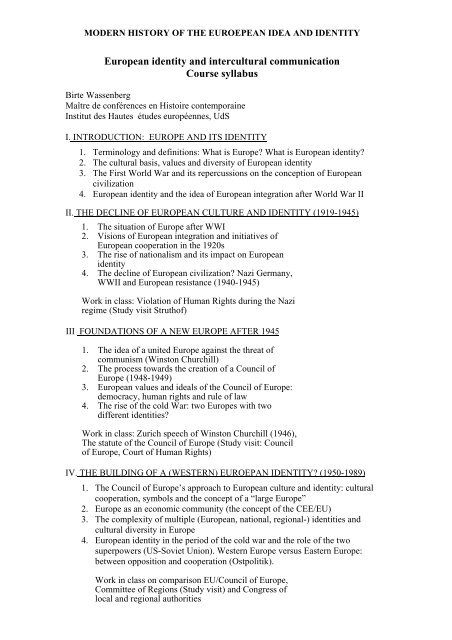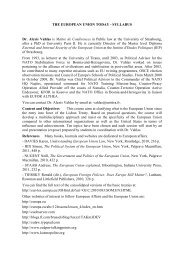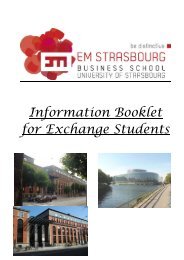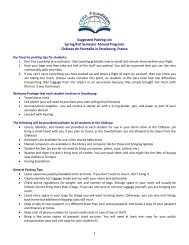European Identity and Cross Cultural Communication
European Identity and Cross Cultural Communication
European Identity and Cross Cultural Communication
You also want an ePaper? Increase the reach of your titles
YUMPU automatically turns print PDFs into web optimized ePapers that Google loves.
MODERN HISTORY OF THE EUROEPEAN IDEA AND IDENTITY<br />
<strong>European</strong> identity <strong>and</strong> intercultural communication<br />
Course syllabus<br />
Birte Wassenberg<br />
Maître de conférences en Histoire contemporaine<br />
Institut des Hautes études européennes, UdS<br />
I. INTRODUCTION: EUROPE AND ITS IDENTITY<br />
1. Terminology <strong>and</strong> definitions: What is Europe? What is <strong>European</strong> identity?<br />
2. The cultural basis, values <strong>and</strong> diversity of <strong>European</strong> identity<br />
3. The First World War <strong>and</strong> its repercussions on the conception of <strong>European</strong><br />
civilization<br />
4. <strong>European</strong> identity <strong>and</strong> the idea of <strong>European</strong> integration after World War II<br />
II. THE DECLINE OF EUROPEAN CULTURE AND IDENTITY (1919-1945)<br />
1. The situation of Europe after WWI<br />
2. Visions of <strong>European</strong> integration <strong>and</strong> initiatives of<br />
<strong>European</strong> cooperation in the 1920s<br />
3. The rise of nationalism <strong>and</strong> its impact on <strong>European</strong><br />
identity<br />
4. The decline of <strong>European</strong> civilization? Nazi Germany,<br />
WWII <strong>and</strong> <strong>European</strong> resistance (1940-1945)<br />
Work in class: Violation of Human Rights during the Nazi<br />
regime (Study visit Struthof)<br />
III FOUNDATIONS OF A NEW EUROPE AFTER 1945<br />
1. The idea of a united Europe against the threat of<br />
communism (Winston Churchill)<br />
2. The process towards the creation of a Council of<br />
Europe (1948-1949)<br />
3. <strong>European</strong> values <strong>and</strong> ideals of the Council of Europe:<br />
democracy, human rights <strong>and</strong> rule of law<br />
4. The rise of the cold War: two Europes with two<br />
different identities?<br />
Work in class: Zurich speech of Winston Churchill (1946),<br />
The statute of the Council of Europe (Study visit: Council<br />
of Europe, Court of Human Rights)<br />
IV. THE BUILDING OF A (WESTERN) EUROEPAN IDENTITY? (1950-1989)<br />
1. The Council of Europe’s approach to <strong>European</strong> culture <strong>and</strong> identity: cultural<br />
cooperation, symbols <strong>and</strong> the concept of a “large Europe”<br />
2. Europe as an economic community (the concept of the CEE/EU)<br />
3. The complexity of multiple (<strong>European</strong>, national, regional-) identities <strong>and</strong><br />
cultural diversity in Europe<br />
4. <strong>European</strong> identity in the period of the cold war <strong>and</strong> the role of the two<br />
superpowers (US-Soviet Union). Western Europe versus Eastern Europe:<br />
between opposition <strong>and</strong> cooperation (Ostpolitik).<br />
Work in class on comparison EU/Council of Europe,<br />
Committee of Regions (Study visit) <strong>and</strong> Congress of<br />
local <strong>and</strong> regional authorities
MODERN HISTORY OF THE EUROEPEAN IDEA AND IDENTITY<br />
V. TOWARDS A (PAN)EUROPEAN IDENTITY AFTER THE FALL OF THE<br />
BERLIN WALL 1989<br />
1 The Council of Europe’s enlargement after 1989<br />
2 The debate about the “limits” of Europe<br />
3. The EU-enlargement in 2004 <strong>and</strong> 2007<br />
4. Reforms <strong>and</strong> trends of the Council of Europe <strong>and</strong> the EU<br />
Work in class: simulation game on the enlargement of the Council of Europe<br />
VI. THE RISE OF EUROSCEPTICISM<br />
1 The origins of Euroscepticism in the 1980s<br />
2. Decreasing support of public opinion for Europe since the Treaty of<br />
Maastricht (1992)<br />
3. The negative image of Europe <strong>and</strong> its causes: fears <strong>and</strong> deficits<br />
4. Remedies for a renewed (positive) <strong>European</strong> identity by <strong>European</strong><br />
organizations (EU <strong>and</strong> Council of Europe)<br />
Work in class: working groups on factors of Euroscepticism<br />
VII. WORKING TOGETHER IN EUROPE: PROBLEMS OF INTERCULTURAL<br />
COMMUNICATION<br />
1. <strong>European</strong> culture(s) <strong>and</strong> cultural perceptions<br />
2. The origins of intercultural conflicts : stereotypes <strong>and</strong> prejudices<br />
3. Problems in intercultural underst<strong>and</strong>ing<br />
4. Principles <strong>and</strong> practice of intercultural communication<br />
Group work in class on stereotypes<br />
VIII. WORKING TOGETHER IN EUROPE: TOOLS FOR INTERCULTURAL<br />
MANAGEMENT<br />
1. Intercultural management in Europe : definition <strong>and</strong> principles<br />
2. The four phases of project management in an intercultural context<br />
3. Obstacles <strong>and</strong> problems of intercultural management in Europe<br />
4. Guidelines for an efficient <strong>European</strong> projet management<br />
Work in class: interculturel simulation game<br />
X. CHALLENGES FOR EUROPEAN CULTURE AND IDENTITY IN THE 21 st<br />
CENTURY<br />
1 The threat of globalization<br />
2 The threat of capitalism : economic crisis <strong>and</strong> decline<br />
3 New political culture(s) in Europe: a problem for democracy?<br />
4 The deficits of the institutional framework of <strong>European</strong> organizations<br />
CONCLUSIONS : WHICH FUTURE FOR EUROPEAN INTEGRATION AND<br />
IDENTITY?<br />
The limits of <strong>European</strong> integration<br />
1. The limits of <strong>European</strong> identity<br />
2. American identity versus <strong>European</strong> identity?
MODERN HISTORY OF THE EUROEPEAN IDEA AND IDENTITY<br />
CLASS ASSESSMENT<br />
Each student will present a paper (5-10 pages) on one of a list of subjects related to<br />
the course which will distributed in class. There will be an oral presentation in class<br />
<strong>and</strong> a grade for the written paper.<br />
BIBLIOGRAPHIE<br />
BITSCH, M.T., Histoire de la construction européenne, Bruxelles, 2004<br />
BITSCH, M.T (dir.), Cinquante ans de traité de Rome 1957-2007. Regards sur la<br />
construction européenne, Franz Steiner Verlag, Stuttgart, 2009.<br />
BOSSUAT, Gérard., Les fondateurs de l'Europe, Paris, 1994<br />
DADDOW, Olivier, J. (dir.), Harold Wilson <strong>and</strong> <strong>European</strong> integration. Britain’s<br />
second application to join the EEC, London, 2003.<br />
DUMOULIN, Michel (dir.), Socio-economic governance <strong>and</strong> <strong>European</strong><br />
identity, Yuste, 2005.<br />
DU REAU, Elisabeth., L'idée d'Europe au XX è siècle, Bruxelles, 1996<br />
FRANK, Robert, Les identités en Europe au XX è siècle: convergences, diversité et<br />
solidarités, Paris, 2004<br />
GERBET, Pierre, La construction de l'Europe, Paris, 1999<br />
GILLINGHAM, John, Coal, steel <strong>and</strong> the rebirth of Europe (1945-1955). The<br />
Germans <strong>and</strong> French from Ruhr conflict to Economic Community, Cambridge,<br />
1991<br />
KOPECKY, Petr/MUDDE, Cas, « The two sides of Euroscepticism: party positions<br />
on <strong>European</strong> integration in East Central Europe », <strong>European</strong> Union Politics, 2002,<br />
vol. 3, n° 3, p. 297-326<br />
LIBERA, Martial/WASSENBERG, Birte, L’Europe au cœur, Bruxelles, 2009<br />
LUDLOW, Piers N., Dealing with Britain, the Six <strong>and</strong> the first UK application to the<br />
EEC, Cambridge, 1997<br />
MILWARD, Alan, S., The frontier of National sovereignty. History <strong>and</strong> theory<br />
(1945-1992), London, 1994<br />
PADGEN, Anthony, The idea of Europe. From Antiquity to the <strong>European</strong> Union,<br />
Cambridge, 2002.<br />
RUANE, Kevin, the rise <strong>and</strong> fall of the <strong>European</strong> Defense Community. Anglo-<br />
American relations <strong>and</strong> the crisis of <strong>European</strong> defense (1950-1955), New York,<br />
2000.<br />
TAGGART, Paul/SZCZERBIAK, Aleks (dir.), Opposing Europe ? The Comparative<br />
Party Politics of Euroscepticism, Oxford, Oxford University Press, 2007.<br />
FRANK, R, Les identités en Europe au XX è siècle: convergences, diversité et<br />
solidarités, Paris, 2004<br />
GIRAULT, René, Identité et conscience européenne au XX è siècle, Paris, 1994<br />
SCHIRMANN, Sylvain., Organisation internationales et architectures européennes,<br />
1929-1939, Metz, 2003<br />
SCHIRMANN, Sylvain, Quel ordre européen? De Versailles à la chute du III è<br />
Reich, Paris, 2006<br />
Council of Europe<br />
BITSCH, Marie-Thérèse, Jalons pour une histoire du Conseil de l’Europe, actes du<br />
Colloque, de Strasbourg (8-10 juin 1995), Peter Lang, Berne, 1997<br />
BOND, Martyn The Council of Europe <strong>and</strong> human rights - An introduction to the<br />
<strong>European</strong> Convention on Human Rights, Council of Europe, Strasbourg, 2010<br />
COLEMAN, John, The conscience of Europe, Council of Europe, Strasbourg, 1999<br />
HALLER, Bruno, An Assembly for Europe - The Council of Europe's Parliamentary<br />
Assembly 1949-1989, Council of Europe, Strasbourg, 2006
MODERN HISTORY OF THE EUROEPEAN IDEA AND IDENTITY<br />
The Parliamentary Assembly - Practice <strong>and</strong> Procedure, Council of Europe,<br />
Strasbourg, 2009<br />
HUBER, Denis, A decade which made History - The Council of Europe 1989-1999,<br />
Council of Europe, Strasbourg, 2009<br />
KICKER, Renate, The Council of Europe - Pioneer <strong>and</strong> guarantor for human rights<br />
<strong>and</strong> democracy, Council of Europe, Strasbourg, 2010.<br />
ROYER, Aline, The Council of Europe, Council of Europe, Strasbourg, 2010<br />
The challenges of a greater Europe - the Council of Europe <strong>and</strong> democratic security,<br />
Council of Europe, Strasbourg, 1998<br />
Voices of Europe, Book + CD, Council of Europe, Strasbourg, 1998.<br />
WIATER, Patricia, Intercultural Dialogue in the Framework of <strong>European</strong> Human<br />
Rights Protection, Council of Europe, Strasbourg, White Paper Series - Volume 1,<br />
2010.<br />
<strong>Cross</strong>-border cooperation <strong>and</strong> intercultural competence<br />
ANDERSON, Malcolm./BORT, Eberhard., The frontiers of the <strong>European</strong> Union,<br />
2001<br />
ANDERSON, Malcolm, Frontier regions in Western Europe, London, 1983;<br />
ANDERSON, Malcolm/BORT, Eberhard., Boundaries <strong>and</strong> identities: the Eastern<br />
frontier of the <strong>European</strong> Union, Edinburgh, 1996<br />
ANDERSON, Malcolm, Border regions <strong>and</strong> security in an enlarged Europe,<br />
Florence, 2000<br />
BECK, Joachim/THEDIECK, Franz, The <strong>European</strong> dimension of administrative<br />
culture, Nomos, Baden-Baden, 2008, pp.222-250.<br />
DEMORGON, Jacques, WILL-MULLER, Evelyne, Guide interculturel pour<br />
l’animation des réunions transfrontalières, Luxembourg, 2007.<br />
HALL Edward, Hidden differences: Studies in International <strong>Communication</strong>,<br />
Hamburg, 1983<br />
HALL Edward T./REED Mildred, underst<strong>and</strong>ing cultural differences, Germans,<br />
French <strong>and</strong> Americans, Boston, London, 1990<br />
HALL, Edward T., The danse of life, Garden City 1983<br />
HOFSTEDE, Geert, Culture's Consequences, Comparing Values, Behaviors,<br />
Institutions, <strong>and</strong> Organizations Across Nations, Thous<strong>and</strong> Oaks CA, Sage<br />
Publications, 2001<br />
HOFSTEDE, Geert, HOFSTEDE, Gert-Jan, Cultures <strong>and</strong> Organizations: Software<br />
of the Mind, New York, McGraw-Hill, U.S.A., 2004<br />
LEZZI, Maria, BÜRGI, Thomas, WASSENBERG, Birte, Compétence<br />
interculturelle, manières d’une gestion réussie de projets , Sauerländer 2002<br />
PERKMANN, Markus, <strong>Cross</strong>-border cooperation, euroregions <strong>and</strong> the governance<br />
of cross-border economies, Lancaster, 1997<br />
RATTI, Remigio/REICHMAN, Shalom., Theory <strong>and</strong> practice of crossborder<br />
cooperation, Basel, 1993;<br />
RICQ, Charles, Manuel of <strong>Cross</strong>-border cooperation in Europe, Conseil de l’Europe,<br />
Strasbourg, 2006.<br />
STRASSOLDO, Raimondo, Frontier Regions <strong>and</strong> Regional Planning, Council of<br />
Europe, 1973<br />
USUNIER, Jean Claude, International <strong>and</strong> <strong>Cross</strong>-<strong>Cultural</strong> Management Research,<br />
Sage, 1998<br />
WASSENBERG, Birte, Vers une eurorégion ? La coopération transfrontalière<br />
franco-germano-suisse dans l’espace du Rhin supérieur de 1975 à 2000, Peter<br />
Lang, Bruxelles, 2007<br />
WASSENBERG, Birte (dir.), Vivre et penser la coopération transfrontalière<br />
(Volume I) : les régions frontalières françaises, Steiner-Verlag, Stuttgart, 2009.






